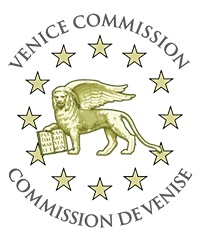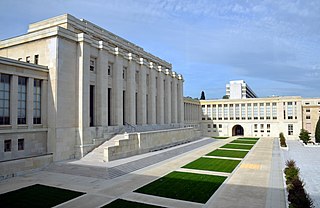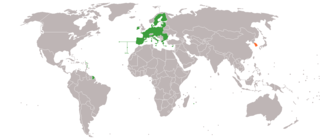
Starting with 18 member states, all member states of the Council of Europe subsequently joined the Venice Commission in 2002. Since then, non-European states can also become full members. As of 2023, the commission counted 61 member states. [1]

Starting with 18 member states, all member states of the Council of Europe subsequently joined the Venice Commission in 2002. Since then, non-European states can also become full members. As of 2023, the commission counted 61 member states. [1]
The 18 founding members: [2]
The 28 other member states of the Council of Europe:
Other member states (mostly outside of Europe), with their year of accession:
Observer members include:
Special co-operation status: [3]

The Council of Europe is an international organisation with the goal of upholding human rights, democracy and the rule of law in Europe. Founded in 1949, it brings together 46 member states with a population of approximately 675 million as of 2023; it operates with an annual budget of approximately 500 million euros.

The European Union (EU) is a supranational political and economic union of 27 member states that are located primarily in Europe. The union has a total area of 4,233,255 km2 (1,634,469 sq mi) and an estimated total population of over 448 million. The EU has often been described as a sui generis political entity combining the characteristics of both a federation and a confederation.

The European Council is where EU leaders meet to set EU's political agenda, but they do not pass laws.

The European Commission (EC) is part of the executive of the European Union (EU). It operates as a cabinet government, with 27 members of the Commission headed by a President. It includes an administrative body of about 32,000 European civil servants. The commission is divided into departments known as Directorates-General (DGs) that can be likened to departments or ministries each headed by a Director-General who is responsible to a Commissioner.
In international relations, intergovernmentalism treats states as the primary actors in the integration process. Intergovernmentalist approaches claim to be able to explain both periods of radical change in the European Union because of converging governmental preferences and periods of inertia because of diverging national interests.

The North Atlantic Treaty Organization, also called the North Atlantic Alliance, is an intergovernmental military alliance of 32 member states – 30 European and two North American. Established in the aftermath of World War II, the organization implements the North Atlantic Treaty, signed in Washington, D.C., on 4 April 1949. NATO is a collective security system: its independent member states agree to defend each other against attacks by third parties. During the Cold War, NATO operated as a check on the threat posed by the Soviet Union. The alliance remained in place after the dissolution of the Soviet Union and the Warsaw Pact and has been involved in military operations in the Balkans, the Middle East, South Asia, and Africa. The organization's motto is animus in consulendo liber. The organization's strategic concepts include deterrence.

The United Nations (UN) is an international organization whose stated purposes are to maintain international peace and security, develop friendly relations among nations, achieve international cooperation, and serve as a centre for harmonizing the actions of nations. It is the world's largest international organization. The UN is headquartered in New York City, and the UN has other offices in Geneva, Nairobi, Vienna, and The Hague, where the International Court of Justice is headquartered at the Peace Palace.

The Common Foreign and Security Policy (CFSP) is the organised, agreed foreign policy of the European Union (EU) for mainly security and defence diplomacy and actions. CFSP deals only with a specific part of the EU's external relations, which domains include mainly Trade and Commercial Policy and other areas such as funding to third countries, etc. Decisions require unanimity among member states in the Council of the European Union, but once agreed, certain aspects can be further decided by qualified majority voting. Foreign policy is chaired and represented by the EU's High Representative, currently Josep Borrell.

The European Communities (EC) were three international organizations that were governed by the same set of institutions. These were the European Coal and Steel Community (ECSC), the European Atomic Energy Community, and the European Economic Community (EEC); the last of which was renamed the European Community (EC) in 1993 by the Maastricht Treaty establishing the European Union. The European Union was established at that time more as a concept rather than an entity, while the Communities remained the actual subjects of international law impersonating the rather abstract Union, becoming at the same time its first pillar. In the popular language, however, the singular European Community was sometimes inaccurately used interchangeably with the plural phrase, in the sense of referring to all three entities.
European integration is the process of industrial, economic, political, legal, social, and cultural integration of states wholly or partially in Europe, or nearby. European integration has primarily but not exclusively come about through the European Union and its policies.

Although there has been a large degree of integration between European Union member states, foreign relations is still a largely intergovernmental matter, with the 27 states controlling their own relations to a large degree. However, with the Union holding more weight as a single entity, there are at times attempts to speak with one voice, notably on trade and energy matters. The High Representative of the Union for Foreign Affairs and Security Policy personifies this role.
A continental union is a regional organization which facilitates pan-continental integration. Continental unions vary from collaborative intergovernmental organizations, to supranational politico-economic unions. Continental unions are a relatively new type of political entity in the history of human government. Throughout most of human history, political organization has been at the local level and in more recent centuries, the sub-regional ("regional")/sub-continental level ; however, starting with the advent of better transportation, weapons and communication there was for the first time the ability for a union of member states to organize at the continental level. After the devastation of the First and Second World Wars in the middle of the twentieth century, Europe began to slowly integrate with the founding of the "European Community", which became a political union covering much of the European continent.

The Venice Commission, officially European Commission for Democracy through Law, is an advisory body of the Council of Europe, composed of independent experts in the field of constitutional law. It was created in 1990 after the fall of the Berlin Wall, at a time of urgent need for constitutional assistance in Central and Eastern Europe.

An international organization, also known as an intergovernmental organization or an international institution, is an organization that is established by a treaty, or is an instrument governed by international law and possessing its own legal personality, such as the United Nations, the World Health Organization, International Union for Conservation of Nature, and NATO. International organizations are composed of primarily member states, but may also include other entities, such as other international organizations, firms, and nongovernmental organizations. Additionally, entities may hold observer status. An alternative definition is that an international organization is a stable set of norms and rules meant to govern the behavior of states and other actors in the international system.

Renate Weber is a Romanian lawyer and human rights activist who, in November 2007, was elected as Member of the European Parliament. She is the first Romanian appointed as Chief of an EU Election Observation Mission. Between 2004–2005 she was Advisor on constitutional and legislative matters to then President of Romania, Traian Băsescu. She previously served as the Romanian Ombudsman as well from June 2019 until mid June 2021.

The area of freedom, security and justice (AFSJ) of the European Union (EU) is a policy domain concerning home affairs and migration, justice as well as fundamental rights, developed to address the challenges posed to internal security by collateral effects of the free movement of people and goods in the absence of border controls or customs inspection throughout the Schengen Area, as well as to safeguard adherence to the common European values through ensuring that the fundamental rights of people are respected across the EU.

The European Union (EU) has had permanent observer status at the United Nations (UN) since 1974, and has had enhanced participation rights since 2011. The EU itself does not have voting rights but it is represented alongside its 27 members, one of which, France, is a permanent member of the Security Council.

The Council of Europe was founded on 5 May 1949 by ten western and northern European states, with Greece joining three months later, and Iceland, Turkey and West Germany joining the next year. It now has 46 member states, with Montenegro being the latest to join.

The European Union (EU) and South Korea are important trade partners: As of April 2023, Korea is the EU's third-largest importer. Excluding European countries, Korea has secured the third place on the list, following China and the United States. And the EU is Korea's third largest export destination. The two have signed a free trade agreement which came into effect at end of 2011. Furthermore, South Korea is the only country in the world with the three agreements covering economics, politics and security in effect as of 2020.